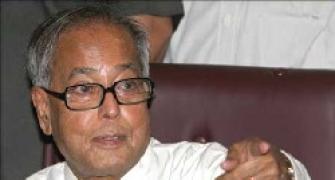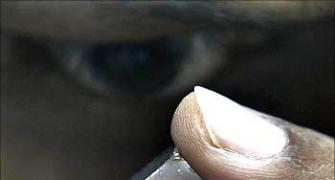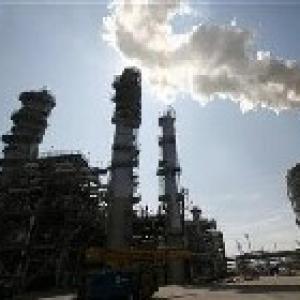 The country's chief statistician T C A Anant on Wednesday said high global crude prices could impact India's economic growth in 2011-12 and projected that the GDP is likely to grow by around 8.5 per cent during the fiscal.
The country's chief statistician T C A Anant on Wednesday said high global crude prices could impact India's economic growth in 2011-12 and projected that the GDP is likely to grow by around 8.5 per cent during the fiscal.
He also said that headline inflation will fall below the 8 per cent mark by August-September if the country receives a normal monsoon.
"Oil situation is a matter of worry and it is likely that oil prices internationally will harden significantly... Crude is also a major input. So it may be a factor which will dampen some of our growth expectations," Anant said.
Asked how much the country's economic growth could be in 2011-12, he said: "The expectation now is that probably it will be now 8.5 per cent. This is subject to the assumption on how effectively do we manage the oil price situation."
In its pre-Budget economic survey, the government had projected that the country's GDP would grow by 9 per cent this fiscal.
However, the Reserve Bank, in its monetary policy for 2011-12 released earlier this month, pegged GDP growth at 8 per cent and said inflationary pressure would affect growth. Finance Minister Pranab Mukherjee and other senior figures in the government also recently said that growth would be below 9 per cent.
Anant said the current political turmoil in parts of the Middle East and North Africa (MENA), along with the recent tsunami and earthquake and subsequent radiation leakage that hit Japan, could affect oil prices.
"The Middle East situation is an area of concern. It is likely that the fall-out of the events in Japan may temporarily raise demand for fossil fuel like oil and gas while they review their nuclear dependence... I suspect these (factors) will contribute to a certain measure of hardening of crude prices," the chief statistician said.
Global crude prices are currently above $100 per barrel on account of events in the MENA region, particularly the civil war in Libya, a major oil exporter and OPEC member.
Regarding inflation, Anant said the rate of price rise of food items is showing a declining trend. Asked by when headline inflation is likely to fall below 8 per cent, he said: "My guess is that if all goes well and if by July it appears that monsoon is normal, I think... maybe by mid-year, either August or September, we should see inflation rates moderate. But I am putting a big assumption there."
Headline inflation in the country has been above the 8 per cent mark since January, 2010. In April, overall inflation stood at 8.66 per cent, as against over 9 per cent in March.
In its annual policy, the RBI had said that while inflationary pressure from food items has been declining, concerns remain about high global commodity prices.
It projected that inflation would average 9 per cent during the first half of the fiscal, before moderating to 6 per cent by year-end. Yesterday, Finance Minister Pranab Mukherjee had also said that inflation is showing a "declining trend".
Food inflation, which remained in double digits for most of 2010, fell to an 18-month low of 7.47 per cent in the first week of May. However, inflation in the manufacturing segment was 6.18 per cent in April.
Experts have been warning against high inflation in the core (non-food) segment. Regarding the new Consumer Price Index (CPI), which factors in retail prices across the country, Anant said it will take some time before inflation figures emerge from it.
"The CPI indices are tricky to read at the moment for inflation, as the interpretation is very complicated," he said, adding that inflation numbers under the index would be available from January next year. Regarding the growth in the fourth quarter of 2010-11, he said data is still being worked upon. Asked about the growth numbers for last fiscal, which are going to be released next month, he said: "For 2010-11, we had given an advance estimate of 8.6 per cent. That is being pulled in two directions.
"There is a downward pressure by the fact that subsequent data on Index of Industrial Production (IIP) is slightly lower, the subsequent data on agriculture is slightly higher. So the net effect... I don't know."








